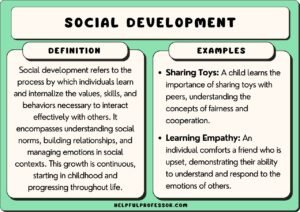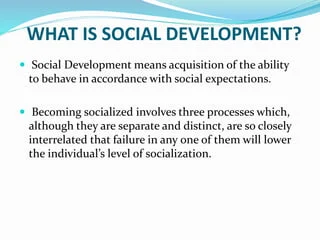Social development is a multifaceted concept that plays a crucial role in the progress and well-being of societies around the world. It encompasses the improvement of social conditions, the promotion of equitable opportunities, and the enhancement of individuals’ and communities’ quality of life. This overview delves into what social development entails, its key components, and its significance in contemporary society.

Defining Social Development
Social development refers to the process of improving the social and economic conditions of people in a society. It involves initiatives aimed at reducing poverty, promoting education, ensuring access to healthcare, fostering gender equality, and enhancing overall quality of life. The ultimate goal of social development is to create a more just and inclusive society where everyone has the opportunity to thrive.
Key Components of Social Development
- Education: Education is a cornerstone of social development. Access to quality education empowers individuals with the knowledge and skills necessary to improve their lives and contribute to their communities. It promotes critical thinking, problem-solving abilities, and informed decision-making, which are essential for personal and societal growth.
- Healthcare: Access to healthcare is fundamental to social development. Ensuring that all individuals have access to medical services, preventative care, and health education can significantly improve the overall health and well-being of a population. Healthy individuals are more productive, and healthier societies are better positioned to achieve sustainable development.
- Economic Growth: Economic growth is a key driver of social development. It creates jobs, reduces poverty, and enhances the standard of living. Policies that promote economic stability, entrepreneurship, and fair wages are integral to fostering economic growth and, consequently, social development.
- Gender Equality: Gender equality is essential for social development. Ensuring that men and women have equal opportunities in all aspects of life, including education, employment, and political participation, leads to more balanced and just societies. Gender equality also contributes to economic growth and improves the quality of life for all citizens.
- Social Inclusion: Social inclusion is about ensuring that all individuals, regardless of their background, have the opportunity to participate fully in society. This includes marginalized groups such as ethnic minorities, people with disabilities, and the elderly. Policies and programs that promote social inclusion help to build cohesive and resilient communities.
- Environmental Sustainability: Environmental sustainability is increasingly recognized as a crucial component of social development. Sustainable practices ensure that natural resources are preserved for future generations, reducing environmental degradation and promoting a healthier, more sustainable way of life.
The Significance of Social Development
Social development is significant for several reasons:
- Improved Quality of Life: Social development initiatives directly improve individuals’ quality of life by providing access to essential services such as education, healthcare, and housing. When people’s basic needs are met, they are better able to pursue personal and professional goals.
- Reduction of Inequality: Social development aims to reduce inequalities within and between societies. By promoting equitable access to resources and opportunities, social development helps to bridge gaps between different social groups, fostering a more just and fair society.
- Economic Stability: A society with strong social development foundations is more likely to experience economic stability. Educated, healthy, and inclusive societies are better equipped to innovate, grow, and adapt to changing economic conditions.
- Social Cohesion: Social development fosters social cohesion by promoting inclusivity and equity. When people feel valued and included, they are more likely to contribute positively to their communities, resulting in stronger, more resilient societies.
- Sustainable Development Goals: Social development is integral to achieving the United Nations’ Sustainable Development Goals (SDGs). These goals encompass a wide range of targets aimed at ending poverty, promoting well-being, and ensuring sustainable development worldwide.
Conclusion
Social development is a vital process that enhances the social and economic conditions of societies, aiming for a more inclusive, equitable, and sustainable world. By focusing on key components such as education, healthcare, economic growth, gender equality, social inclusion, and environmental sustainability, societies can create environments where all individuals have the opportunity to thrive. Understanding and promoting social development is essential for building a better future for everyone.



